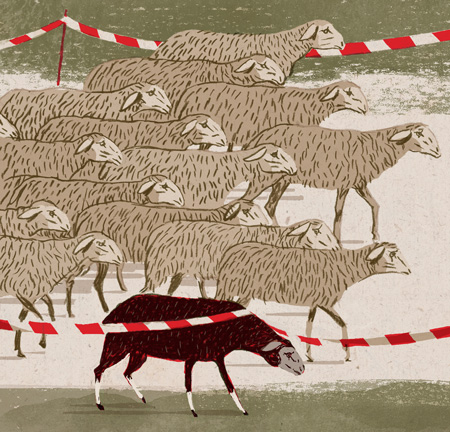
Illustration by Pep Montserrat
Dorian Persaud is a seasoned employment law attorney with offices in the United States and Canada who has served on the board of governors of Knox College, University of Toronto. His firm has developed an assessment tool to help organizations anticipate and understand crisis issues before they happen and conducts training in best practices for managing complaints and investigations. In Trust’s Matt Hufman spoke with him and identified five takeaways, with Persaud’s answers, from their conversation.
Prepare: Assess policies and the campus climate to anticipate potential problems
Often, the administration and the board are so focused on finances and enrollment that human resource issues take a backseat, but I guarantee you that there is an administrator out there who has heard rumors of harassment or things that may have been said or done. An assessment is a good starting point for folks who are feeling uneasy. You don’t want to be in a position of leadership while flying blind; you want to have a sense of what’s happening on campus and in the work environment. Take meaningful steps to build a strong culture of accountability, and put the systems in place to monitor smoldering issues that may emerge as full-fledged crises. At the very least, make sure that you’re well prepared if this happens.
Take Care: Investigations have high stakes and bias must be avoided
Somebody’s job or reputation is on the line, so you have to make sure that investigations of complaints are done correctly. There’s nothing worse than having a serious allegation arise that just gets bungled, leaving everyone upset. If you’re doing the investigation internally, training is key. Make sure that whoever is handling the investigation feels confident that they can set up this investigation and they can execute it. But even if you have that, another thing to think about is: Is it appropriate for us to handle this in-house? Sometimes an allegation might involve a senior member of the board, a superstar member of faculty, or a senior administrator.
Another aspect of this too that’s really important to consider is just the issue of bias and the perception of bias. Consider if the allegation is against the superstar or a prominent member of the community. If that is handled in-house and the person is ultimately exonerated, is there going to be that perception within the college community that maybe this person got off easy because of who they are? The question is: Are we doing this with integrity and free from the perception of bias?
Actions speak: How you respond reveals your beliefs
It’s one thing to say, “Here’s what we believe,” but it’s another matter to act on that. So when you’re doing an investigation and you’re doing it in the right way, you’re demonstrating to all members of the community that, yes, we do take our policies and our values seriously, and you are reinforcing their faith in the institution. There’s a lot of good that comes from integrity and transparency during an investigation and doing it in the right way, despite the difficult circumstances. And there’s a lot of bad that can result from doing it wrongly.
Review: Policies need to be reviewed by the administration and board regularly
When something goes wrong, that’s when we go looking to figure out what the policy says and what we need to do. There should be a system or policy mandating that the administration and/or board reviews its policies annually. That doesn’t mean making wholesale changes or anything extremely in depth, but there may be a new legal case or best practice to be adopted. This allows the board to ask the critical questions of who’s doing this role, has the person been trained and do they know they’re responsible?
Do your work: Craft your own policies
Definitely don’t go online and just adopt what somebody else has done. I always advise clients to put together a draft for your specific situation (or at least identify the elements you need) and then have a competent employment lawyer sit down and work with you to refine it. It’s also helpful to have someone from your Christian community help because there’s a lot of nuance in terms of relationships and norms within the community that may otherwise be missed.
See the full conversation and a link for a free assessment tool click here.